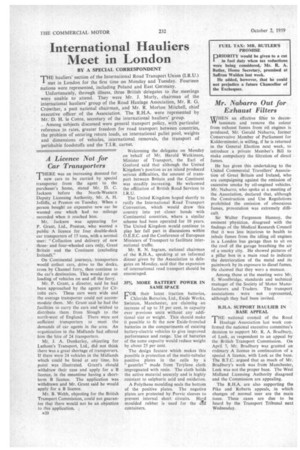Mr. Nabarro Out for Exhaust Filters
Page 54

If you've noticed an error in this article please click here to report it so we can fix it.
WHEN an effective filter to decon.YY taminate and remove the colour from exhaust fumes from oil engines is produced, Mr. Gerald Nabarro, former Conservative Member of Parliament for Kidderminster, is willing, if he is returned in the General Election next week, to introduce a private Member's Bill to make compulsory the filtration of diesel fumes.
He has given this undertaking to the United Commercial Travellers' Association of Great Britain and Ireland, who are campaigning against the emission of excessive smoke by oil-engined vehicles. Mr. Nabarro, who spoke at a meeting of the Association, declared that, although the Construction and Use Regulations prohibited the emission of obnoxious fumes, prosecution was extremely difficult.
Sir Walter Fergusson Hannay, the eminent physician, disagreed with the findings of the Medical Research Council that it was less injurious to health to inhale fumes from the idling oil engines in a London bus garage than to sit on the roof of the garage breathing the air of a smoky city. He showed pictures of a pillar box in a main road to indicate the deterioration of the metal and its paintwork by its exposure to diesel fumes. He claimed that they were a menace.
Among those at the meeting were Mr. E. Woodbridge, standards and technical manager of the Society of Motor Manufacturers and Traders. The transport associations were not represented, although they had been invited.
R.H.A. SUPPORT HAULIER IN BASE APPEAL
THE national council of the Road Haulage Association last week confirmed the national executive committee's decision to support Mr. R. A. Bradbury, of Leek, as respondent to an appeal by the British Transport Commission. On April 7, Mr. Bradbury was granted an ordinary A licence in continuation of a special A licence, with Leek as the base. The B.T.C. argued that as much of Mr. Bradbury's work was from Manchester, Leek was not the proper base. The West Midland Licensing Authority disagreed and the Commission are appealing.
The R.H.A. are also supporting the Pike and Roberts appeals, in which changes of normal user are the main issue. These cases are due to be heard by the Transport Tribunal next Wednesday.












































































































































































































































